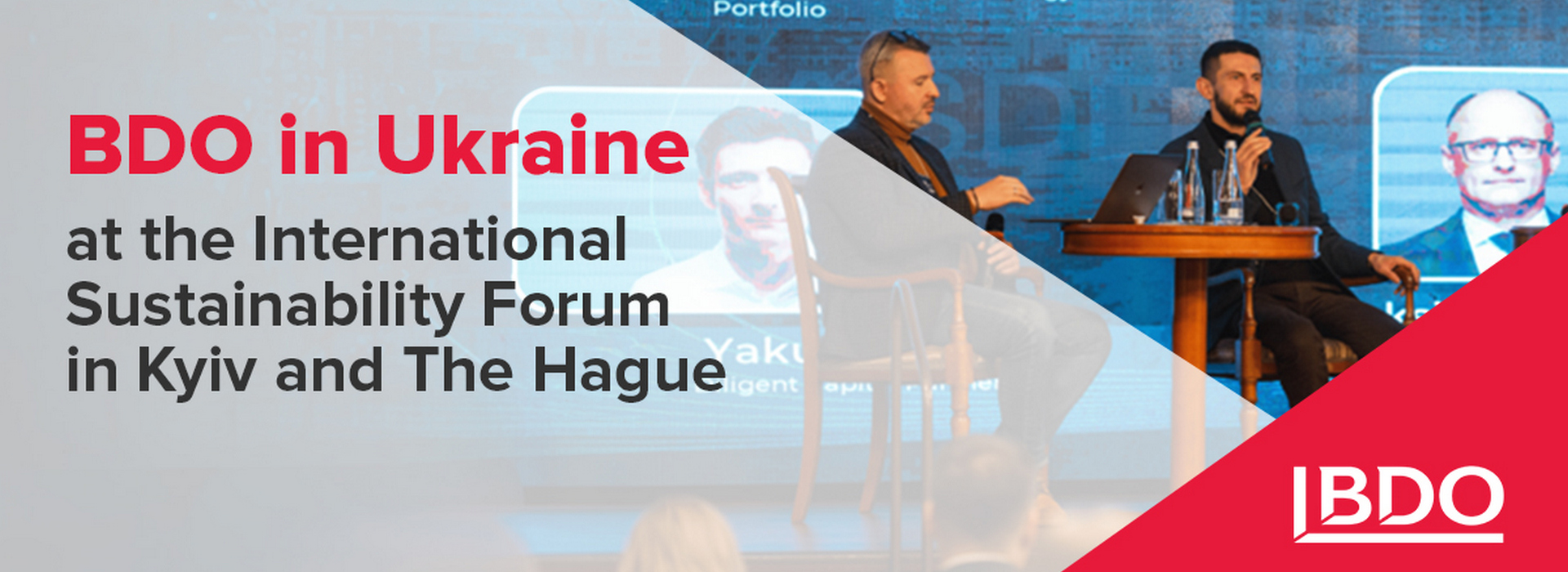On October 24, Kyiv and October 25, The Hague hosted the 4th International Sustainability Forum 2024, organized by ASDE.
The primary objective of the event was to convene key stakeholders, including representatives from business, government, civil society and international investors from Ukraine and the EU, to explore strategies for Ukraine’s economic recovery based on sustainable development. The event offered a platform for discussions on forming a partnership business ecosystem that will facilitate the country’s green transformation.

The forum was attended by leading Ukrainian and international experts, representatives of the government, business, international organizations, banking and public sectors. The ESG specialists Victoria Sukhanenko and Maria Tretiak represented BDO in Ukraine.
Panel discussions at the forum addressed the following topics:
1. Ukraine’s accession to the EU: what is needed for economic growth based on sustainable development?
The panelists highlighted the need for significant reforms in the economic and legislative spheres, as well as the development of sustainable infrastructure, to ensure successful integration into the EU. Adapting Ukrainian enterprises to European environmental standards is crucial for enhancing competitiveness and accessing new markets.
2. The role and influence of donor organizations during the war and post-war reconstruction: ESG programs and plans in Ukraine
During the war and in the post-war recovery period, donor organizations play a pivotal role in supporting Ukraine’s economic and social resilience. Through the ESG (environmental, social, governance) framework, donors are directing funding to projects that meet sustainable development goals and have a long-term positive impact on Ukraine’s society and economy.
Robert Adamchyk, the representative of the EBRD, discussed the bank’s approach to projects based on ESG criteria:
- environmental and social due diligence is conducted for each project
- all projects should have monitoring programs
- the bank provides specific climate reporting assistance to help clients develop and implement climate management.
Post-war planning includes investment in sustainable infrastructure with a focus on green technologies, urban reconstruction and modernization of transport and water resources. Support programs are designed to develop small and medium-sized enterprises through microfinance and special economic zones in the affected regions. There is a particular emphasis on creating new jobs in green energy, renewable infrastructure and the agricultural sector.
Roman Shakhmatenko, the representative of the UNDP, introduced the program “Five Steps to Restore Ukraine”:
- Building nationwide reconstruction and the capacity to determine priorities
- Promoting evidence-based decision-making
- Promoting reforms and fighting corruption
- Channeling global investment for inclusive economic recovery
- Returning home of Ukrainians.
3. Securing funding, forming partnerships for recovery and achieving sustainable development goals
The discussion focused on the role of international investors in providing Ukraine with sustainable financing for post-war reconstruction. The speakers highlighted the importance of establishing a transparent and predictable legal framework to attract investment.
4. ESG disclosure as a path to social and economic change — engaging all stakeholders
On October 18, the Cabinet of Ministers of Ukraine adopted a resolution “On Approval of the Strategy for the Implementation of Sustainability Reporting by Enterprises”. In 2024, ESG disclosure will become a key requirement for companies as regulators and investors increasingly demand transparency in environmental, social and governance aspects. The combination of financial and non-financial reporting, supported by mandatory audit and verification of ESG data, guarantees the reliability and integrity of information for all stakeholders. This approach contributes to social and economic change by engaging investors and customers in a shared responsibility for sustainable development, while increasing trust in the business and its strategy.
5. Cooperation to strengthen the resilience and post-war recovery of the region — unlocking the financial market
The restoration of the financial market and its integration into international systems is crucial for the stabilization of the Ukrainian economy. The discussion focused on the need to develop a partnership between international investors and Ukrainian financial institutions to create long-term programs to support the economy.
6. Building sustainable infrastructure: innovative approaches to energy security and water management
The participants discussed the significance of integrating new technologies in the energy sector and water management. This will facilitate Ukraine’s energy independence and guarantee the uninterrupted operation of critical infrastructure even in times of crisis.
7. Sustainable value chains: integrating circular economy and resource efficiency principles into Ukraine’s recovery strategy
Integrating circular economy and resource efficiency principles into Ukraine’s economic recovery strategy is an important step toward building sustainable value chains. This includes maximizing the use of resources through reuse, recycling and minimizing waste, which helps to reduce environmental impacts. Sustainable value chains increase the competitiveness of Ukrainian companies in international markets, attracting investment and promoting economic growth. Moreover, this approach supports energy independence and reduces dependence on imported raw materials.
8. The role of human capital development in post-war growth
Human capital development is a critical driver of Ukraine’s post-war growth, as innovation and skilled labor are essential for rebuilding and modernizing the economy. Investments in education, training and retraining will enhance productivity and enable the country to adapt to modern market challenges. The recovery process will necessitate new knowledge in digitalization, green energy and resource management, which will increase global competitiveness. Creating an environment conducive to talent development and supporting entrepreneurship will also contribute to the growth of the middle class and strengthen social stability. Successful human capital development will serve as the foundation for long-term economic recovery and sustainable development of Ukraine.
9. Food and agriculture affected by the war: challenges for producers in Ukraine and the EU
The war has had a devastating impact on Ukraine’s food systems and agriculture, with notable disruptions to supply chains, limitations to market access and the destruction of infrastructure. For Ukrainian producers, the main challenges were lack of resources, logistical difficulties and export restrictions. In the EU, producers faced price volatility and shortages of raw materials, which increased costs and risks to food security. Export markets in both regions were also affected, causing fluctuations in the agricultural sectors. Overcoming these challenges requires coordinated efforts, investment in sustainable technologies and support from international partners.
“The 4th International Sustainability Forum offered a unique opportunity to debate Ukraine’s potential integration into the EU and the challenges and opportunities of sustainable development. The outcome of the discussions has demonstrated that the most effective way forward is to combine the efforts of the government, business and international partners. This is an opportunity to enhance collaboration, addressing the pivotal challenges and deficiencies in green recovery and sustainable economic development.” — stated Victoria Sukhanenko.
If you have any questions, feel free to contact us. The team of BDO in Ukraine actively cooperates with donor organizations, private sector and the government and offers expert support for the implementation of ESG programs, adaptation to European standards and ensuring sustainable development of countries.



























